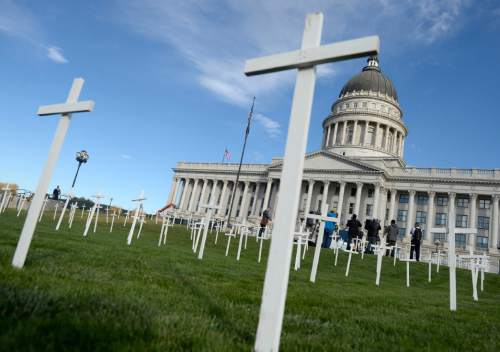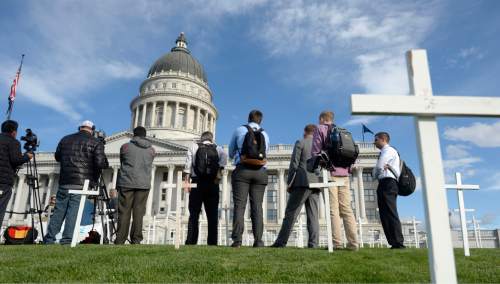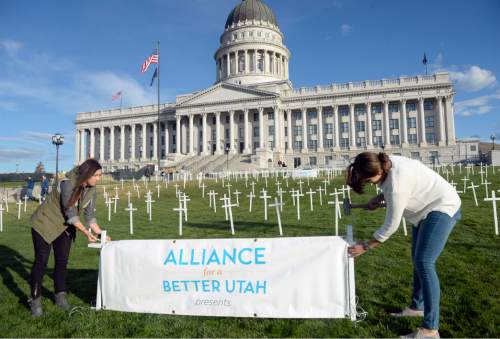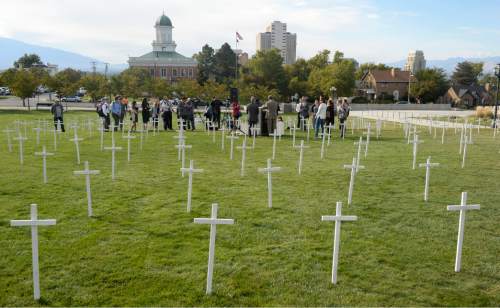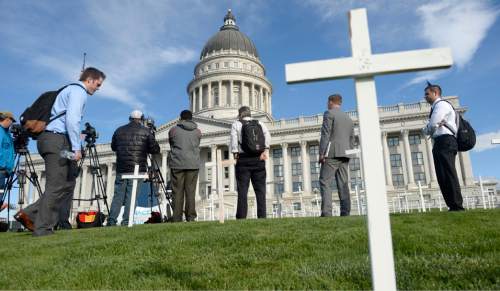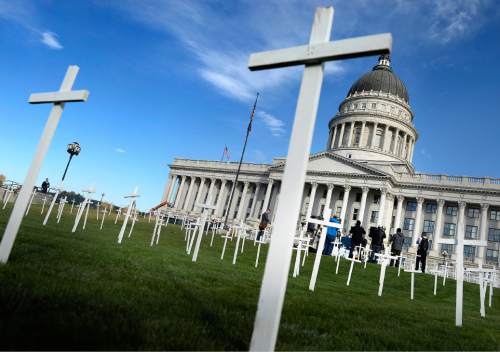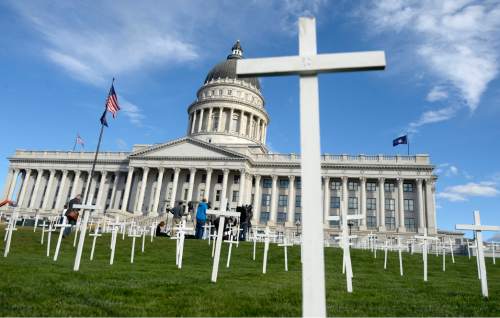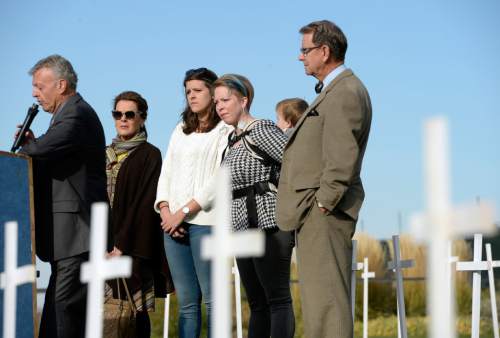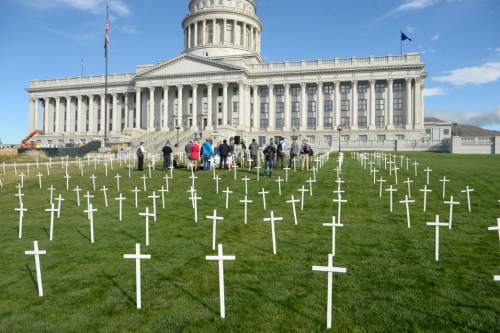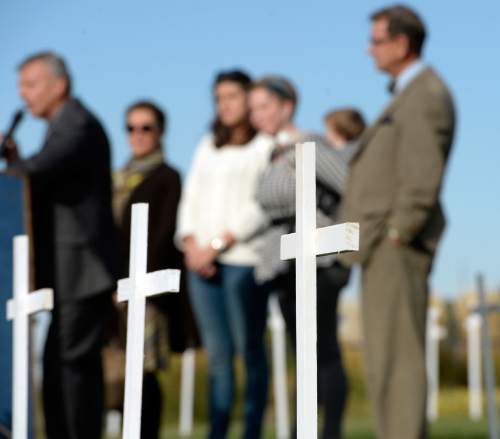Al Hartmann | The Salt Lake Tribune
361 crosses were placed on the front lawn of the Utah State Capitol Thursday Oct. 21 for All
Al Hartmann | The Salt Lake Tribune
361 crosses were placed on the front lawn of the Utah State Capitol Thursday Oct. 21 for All
Al Hartmann | The Salt Lake Tribune
Lauren Howells, left, and Tillie McInnis place 361 crosses on the front lawn of the Utah Sta
Al Hartmann | The Salt Lake Tribune
361 crosses were placed on the front lawn of the Utah State Capitol Thursday Oct. 21 for All
Al Hartmann | The Salt Lake Tribune
361 crosses were placed on the front lawn of the Utah State Capitol Thursday Oct. 21 for All
Al Hartmann | The Salt Lake Tribune
361 crosses were placed on the front lawn of the Utah State Capitol Thursday Oct. 21 for All
AAl Hartmann | The Salt Lake Tribune
361 crosses were placed on the front lawn of the Utah State Capitol Thursday Oct. 21 for Al
Al Hartmann | The Salt Lake Tribune
Board members of Alliance for a Better Utah, Jonathan Ruga, left, Diane Stewart, Tillie McIn
Al Hartmann | The Salt Lake Tribune
361 crosses were placed on the front lawn of the Utah State Capitol Thursday Oct. 21 for All
Al Hartmann | The Salt Lake Tribune
Board members of Alliance for a Better Utah stand in a field of 361 crosses on the front law
Al Hartmann | The Salt Lake Tribune
361 crosses were placed on the front lawn of the Utah State Capitol Thursday Oct. 21 for Alliance for a Better Utah to make a visual point for their press conference. Today marks 657 days since the Utah Legislature had the first opportunity to grant access to affordable healthcare for thousands of Utahns most in need. Better Utah estimates that as many as 361 Utahns (represented by the rows of crosses) have died because they don't have access to affordable healthcare.
Al Hartmann | The Salt Lake Tribune
361 crosses were placed on the front lawn of the Utah State Capitol Thursday Oct. 21 for Alliance for a Better Utah to make a visual point for their press conference. Today marks 657 days since the Utah Legislature had the first opportunity to grant access to affordable healthcare for thousands of Utahns most in need. Better Utah estimates that as many as 361 Utahns (represented by the rows of crosses) have died because they don't have access to affordable healthcare.
Al Hartmann | The Salt Lake Tribune
Lauren Howells, left, and Tillie McInnis place 361 crosses on the front lawn of the Utah State Capitol Thursday Oct. 21 for Alliance for a Better Utah to make a visual point for their press conference. Today marks 657 days since the Utah Legislature had the first opportunity to grant access to affordable healthcare for thousands of Utahns most in need. Better Utah estimates that as many as 361 Utahns (represented by the rows of crosses) have died because they don't have access to affordable healthcare.
Al Hartmann | The Salt Lake Tribune
361 crosses were placed on the front lawn of the Utah State Capitol Thursday Oct. 21 for Alliance for a Better Utah to make a visual point for their press conference. Today marks 657 days since the Utah Legislature had the first opportunity to grant access to affordable healthcare for thousands of Utahns most in need. Better Utah estimates that as many as 361 Utahns (represented by the rows of crosses) have died because they don't have access to affordable healthcare.
Al Hartmann | The Salt Lake Tribune
361 crosses were placed on the front lawn of the Utah State Capitol Thursday Oct. 21 for Alliance for a Better Utah to make a visual point for their press conference. Today marks 657 days since the Utah Legislature had the first opportunity to grant access to affordable healthcare for thousands of Utahns most in need. Better Utah estimates that as many as 361 Utahns (represented by the rows of crosses) have died because they don't have access to affordable healthcare.
Al Hartmann | The Salt Lake Tribune
361 crosses were placed on the front lawn of the Utah State Capitol Thursday Oct. 21 for Alliance for a Better Utah to make a visual point for their press conference. Today marks 657 days since the Utah Legislature had the first opportunity to grant access to affordable healthcare for thousands of Utahns most in need. Better Utah estimates that as many as 361 Utahns (represented by the rows of crosses) have died because they don't have access to affordable healthcare.
AAl Hartmann | The Salt Lake Tribune
361 crosses were placed on the front lawn of the Utah State Capitol Thursday Oct. 21 for Alliance for a Better Utah to make a visual point for their press conference. Today marks 657 days since the Utah Legislature had the first opportunity to grant access to affordable healthcare for thousands of Utahns most in need. Better Utah estimates that as many as 361 Utahns (represented by the rows of crosses) have died because they don't have access to affordable healthcare.
Al Hartmann | The Salt Lake Tribune
Board members of Alliance for a Better Utah, Jonathan Ruga, left, Diane Stewart, Tillie McInnis, Crystal Otterstrom with 18-month-old son Edwin and David Irvine stand in a field of 361 crosses on the front lawn of the Utah State Capitol Thursday Oct. 21 to speak at a press conference. Today marks 657 days since the Utah Legislature had the first opportunity to grant access to affordable healthcare for thousands of Utahns most in need. Better Utah estimates that as many as 361 Utahns (represented by the rows of crosses) have died because they don't have access to affordable healthcare.
Al Hartmann | The Salt Lake Tribune
361 crosses were placed on the front lawn of the Utah State Capitol Thursday Oct. 21 for Alliance for a Better Utah to make a visual point for their press conference. Today marks 657 days since the Utah Legislature had the first opportunity to grant access to affordable healthcare for thousands of Utahns most in need. Better Utah estimates that as many as 361 Utahns (represented by the rows of crosses) have died because they don't have access to affordable healthcare.
Al Hartmann | The Salt Lake Tribune
Board members of Alliance for a Better Utah stand in a field of 361 crosses on the front lawn of the Utah State Capitol Thursday Oct. 21 to speak at a press conference. Today marks 657 days since the Utah Legislature had the first opportunity to grant access to affordable healthcare for thousands of Utahns most in need. Better Utah estimates that as many as 361 Utahns (represented by the rows of crosses) have died because they don't have access to affordable healthcare.


